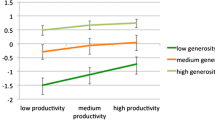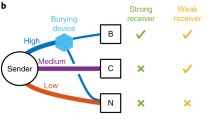Abstract
Trusting in someone's cooperation is often connected with the danger of being exploited. So it is important that signals are exchanged which make it probable enough that the potential partner is reliable. Such signals must be too expensive for partners who are planning to abuse the trust they are given but cheap enough for those who wish to initiate a long-term cooperation. In a game theoretical model, it is shown that such signals could consist of presents given before the partnership starts. These presents must be more expensive than the advantage of a one-period exploitation but smaller than the profit from a long-term partnership. In order to prevent that the receiver only collects presents, and that she is not interested in a firm partnership, these gifts should be of low value for her. Flowers are the prototype of such presents but usually not the only and not the most important signal of this kind. Nor is the partnership between men and women the only example of cooperative relations which are endangered by exploitation – but of all exploitation stories this one is most often narrated.
Similar content being viewed by others
REFERENCES
Becker, G.S. (1993), A Treatise on the Family, First Harvard University Press, paperback edition.
Berg, J., Dickhaut, J. and McCabe, K. (1995), Trust, reciprocity, and social history, Games and Economic Behavior 10: 122-142.
Bolle, F. (1985), Natural and optimal unemployment, JITE (Zeitschrift für die gesamte Staatswissenschaft) 141: 256-268.
Bolle, F. (1991), On love and altruism, Rationality and Society 3: 197-214.
Bolle, F. (1995), Does trust pay?, Discussion paper, Frankfurt (Oder).
Bolle, F. (1998), Rewarding trust: an experimental study, Theory and Decision, 45(1): 85-100.
Camerer, C. (1988), Gifts as economic signals and social symbols, American Journal of Sociology 94, supplement: 180-214.
Carmichael, H.L. and MacLeod, W.B. (1997), Gift giving and the evolution of cooperation, International Economic Review 38(3): 485-509.
Fudenberg, D. and Tirole, J. (1993), Game Theory, 3rd edition, The MIT Press, Cambridge, Massachusetts.
Güth, W. and Kliemt, H. (1994), Competition or co-operation: On the evolutionary economics of trust, exploitation, and moral attitudes, Metroeconomica 45: 155-187.
Kreps, D.M. and Wilson, R. (1982), Reputation and imperfect information, Journal of Economic Theory, 253-279.
Selten, R. (1975), Reexamination of the perfectness concept for equilibrium points in extensive games, International Journal of Game Theory 4: 25-55.
Watzlawick, P. (1983), Anleitung zum Unglücklichsein, R. Piper & Co., Verlag, München.
Webley, P., Lea, S.E.G. and Portalska, R. (1983), The unacceptability of money as a gift, Journal of Economic Psychology 4: 223-238.
Author information
Authors and Affiliations
Corresponding author
Rights and permissions
About this article
Cite this article
Bolle, F. Why to Buy Your Darling Flowers: On Cooperation and Exploitation. Theory and Decision 50, 1–28 (2001). https://doi.org/10.1023/A:1005261400484
Issue Date:
DOI: https://doi.org/10.1023/A:1005261400484




